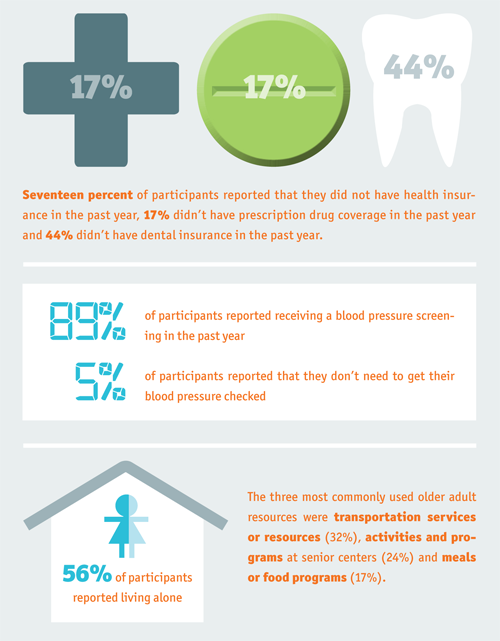PHMC CEO Michael Pearson Named to Philadelphia Magazine’s “150 Most Influential People in Philly”
The annual list celebrates Philadelphians shaping the future of the city. >>
As of Fall 2011, Public Health Management Corporation goes green with online-only publication of our newsletter and our annual report.
Subscribing to our online publications is quick and easy! Thank you for helping us improve our environment by reducing the use of paper.
There are two convenient ways you can read our online issue of Public Health Directions.
As a longtime teacher, Brenda Clark never had a reason to be concerned about accessing health care while she was employed. However, today, as a recent retiree at the age of 54 and a gay woman, Clark worries about both herself and her LGBT peers who may not have easy access to care in their later years. In a recently released study titled “Assessment of Health Needs of LGBT Older Adults in Philadelphia,” researchers at PHMC’s Research and Evaluation Group analyzed the health needs of older LGBT residents in Philadelphia through a comprehensive survey of over 200 people.
The study started with a series of focus groups and individual interviews, which helped to inform the development of the survey instrument. In addition to the qualitative data, the study includes data from 215 self-administered surveys of persons 55 or older living in the Philadelphia area who identified as lesbian, gay, bisexual and/or transgender, or reported a same-sex partner in the past 12 months. All data collection procedures and instruments were developed in collaboration with the project’s 20-person Community Advisory Board, which included members of the LGBT community, like Clark, as well as service providers. “I wanted to look at the issues that affect women my age who have trouble accessing health care,” says Clark. “I’ve always had health insurance and caring providers, but I know not everybody is that lucky. And I know that as I’m getting older, more health issues may come up.”
The groundbreaking study focused on the unique healthcare issues impacting LGBT older adults and, among other findings, revealed that 39 percent of study participants reported negative experiences with healthcare providers. Two-thirds of those reporting a negative experience attributed this mistreatment to their sexual orientation or gender presentation or identity. “There was a great deal of interest from the LGBT community about our study,” says research assistant Janene Brown, who worked on the assessment project and presented the results at a town hall at Philadelphia’s Church of St. Luke and the Epiphany in October. “We wanted to share our findings with care providers and the community, keep them engaged in conversation and get recommendations from them.”
The preliminary release of the study’s results coincided with acceptance of Pennsylvania’s 2012–2016 State Plan on Aging by the US Administration on Aging and the Administration for Community Living, which included input from PHMC researchers on LGBT elder issues. It also explored LGBT older adults’ plans and concerns for the future, including housing and long-term care, and developed policy recommendations to be shared with government agencies and organizations providing services to older adults. “The study found that one in five participants reported that they delayed or were unable to obtain medications, dental care and medical care because of insurance and other factors,” says Brown. “Also these questions asked whether participants didn’t seek medical care/dental care because of the cost alone. These are things providers need to know.”
At the town hall meeting, Clark joined more than 60 others from the LGBT community in giving recommendations that the researchers can implement as part of their project. Audience members provided input in three focus areas: health information for older adults, access to care and social services. Recommendations included more education and outreach targeting older LGBT adults, increased social spaces and programs affirming of older LGBT adults to help decrease isolation, sensitivity training for providers of care and increased availability of sexual health information tailored to the needs of older adults. “The community has come a long way,” says Clark, “but there’s still a long way to go.”
The study, funded by the Pennsylvania Department of Health and the Dr. Magnus Hirschfeld Fund, assessed the healthcare experiences and needs of LGBT older adults in Philadelphia, documented barriers to accessing health care and recommended screenings. The survey provided a more comprehensive snapshot of the senior LGBT experience. "Very few studies have been done of LGBT elders," says Brown. "It's still a field where there's a lot to learn." During the study, "Assessment of Health Needs of LGBT Older Adults in Philadelphia," researchers uncovered the following information from participants:
